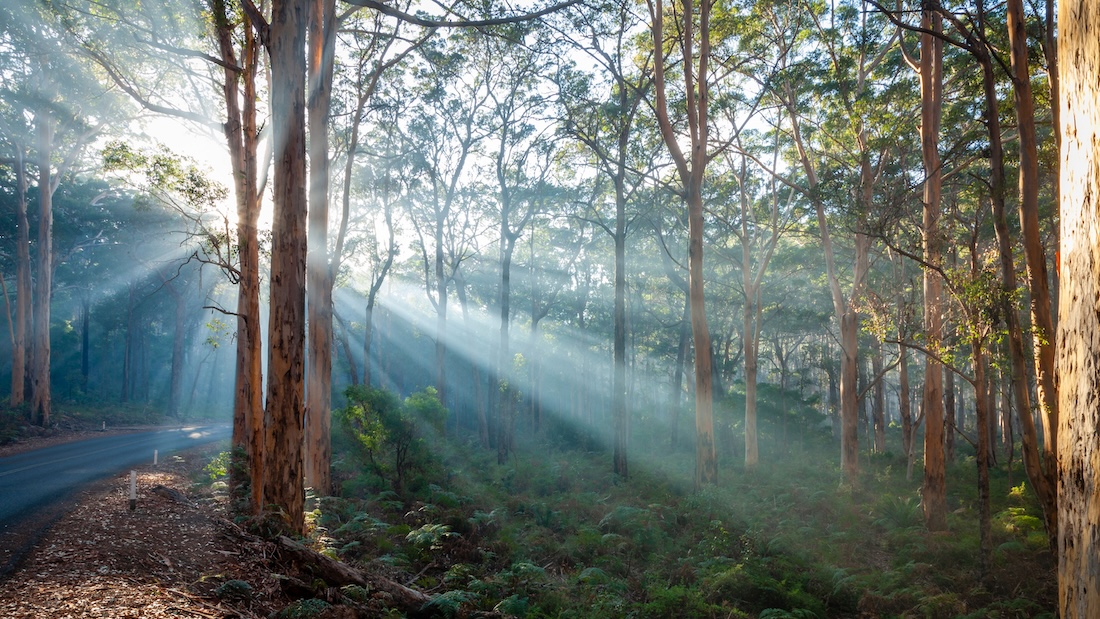
Review: Eucalyptus at Perth Concert Hall
Eucalyptus at Perth Concert Hall
Thursday, February 22, 2024
The next instalment in Perth Festival’s fine music program, Johnathon Mills and Meredith Oakes opera Eucalyptus, was presented last Thursday night at the Perth Concert Hall. Under the baton of Tahu Matheson, Head of Music at Opera Australia, the West Australian Symphony Orchestra and the WA Opera Chorus, along with six of the country’s finest singers, performed this complex and challenging new work. Jointly commissioned by Opera Australia and Victorian Opera, the Perth performance was the world premiere. For the third week in a row, the Concert Hall was chockers.
The overture began with a whisper of eight male voices to a rumbling of double basses and a timorous harp. Gradually, the other instruments joined in, working up the scale from the bass end. The deep flutes and winds, then the celli violas and mezzo section of the choir. Finally, it was the violins, trumpets, xylophone and soprano quarter. The music was then fractious, loud, and wild, like a storm passing through a dense forest. There were echoes of Gorecki’s Symphony of Sorrowful Songs and Ligeti’s Atmospheres, music of the mid-Twentieth Century, at the edge of the envelope.
As the overture ended, four of the featured singers—the three sopranos, Desiree Frahn, Natalie Jones, and Dimity Shepherd, with bass-baritone Simon Meadows—took to their seats at the front of the stage. With the first duet, On the Edge of Holland’s Land, a comic element came into play, and the tone changed. Jones and Shepherd, as ‘the Sprunt Sisters’, two Aussie farm girls, sang a tale set deep in the Australian bush. From the sublime to the ridiculous. The audience began to smile; some even chuckled.
On the third piece, Frahn’s first aria, Riverbank Singing, the tone swung back into a more serious, introspective realm. Haunting and beautiful, her extraordinary voice, swooping and soaring, seemed to mimic the imagery of the water and trees.
And so on it went, jumping between images of nature and a rural farce, all of it underpinned by dense and compelling, though sometimes shrill, orchestral music. Each of the elements—the music and the libretto—were in their own way engaging, but together they didn’t quite gel. It was as though they came from different places and were running with different agendas. The big question was whether this was the whole point of the work?
In the auditorium at interval and again afterwards, many members of the audience expressed their confusion and the need to unpack what they had seen and heard. The extroverts wanted to talk it through there and then, while the introspects wanted to let it settle overnight and see what they thought in the morning.
Was the show an exercise in extended bathos: sublime music in the high-modernist, essentially European tradition set to a ridiculous story of regional Victoria? A cross between Turangalila and Bellbird. Was this meant to reflect the disconnect between European colonisation and the ancient Australian landscape? Hearing banal ocker terms like ‘bloke’ and place names like ‘Drummoyne’ and ‘Fitzroy’ sung in high operatic mode were funny—incongruous to the point of being ridiculous. But then, if that was the point, surely it could have been made in something less than two hours?
And then there was the source, Murray Bail’s Miles Franklin award-winning novel Eucalyptus. Although the opera’s central narrative, the competition to name all the trees on the farm to win the daughter’s hand in marriage, was lifted straight from the novel, this was not the book’s main driver. Rather, it was merely a narrative device upon which Bail could hang his deep exploration of the Australian landscape and, in particular, the complex nature of the genera of Eucalypts. Each chapter was structured upon the unique nature of a different species; the features of each tree were cleverly reconstructed and parodied to shape the narrative.
Those who loved the book and came to the opera expecting a similar immersion in the natural world were left disappointed. Unless Mills was engaging this technique on a higher musical plain, using the quirks of each species to structure the music for each aria, the references in the libretto to the various eucalypts were little more than a way to send up the farcical suitors. This was mere wallpaper, not a serious contemplation of nature.
But the narrative did draw the audience in, in the way that rom-coms do. Everyone wanted to know how the story would end—would the course of true love prevail, or was the heroine, Ellen (Frahn), destined to marry the dullard botanist Cave (Samuel Dundas), who correctly identified all of the trees? But then, maybe it drew the audience in too much? ‘The Stranger’ (Michael Petruccelli), Ellen’s true love interest, and his many entertaining stories filled a good quarter of the concert, but in closely following his anecdotes, the audience was taken further away from the music. It was just too hard to follow both at once.
Worse, at the end, there was only the resolution of the story. There was no deeper insight into the nature of the Australian landscape, let alone the human conundrum. The audience was merely left with a sad old father (Meadows) alone on his farm after his daughter had eloped. As one disgruntled woman muttered on the way out, “Surely, we’re beyond stories of fathers treating their daughters like baubles?” Good point.
Granted, traditionally, the stories in opera are not that deep and are often pitched at a more melodramatic level. A throwback to the days when opera was the preeminent popular form of musical entertainment, the intention then was to give people a simple story to hang their hats on while wooing them with sensational, often rollicking classical music.
But this music, albeit sensational, demanded more of the listener. It was more artful than romping. Marrying it to a potentially deep story but only to focus on the story’s most superficial aspect was a long bow to draw. The indicators were that this would be a serious, integrated work about the natural world. Written and presented at a time when the natural world is in deep crisis, the audience could be forgiven for expecting more. Were the artists making a subtle point about the lack of serious action to address the crisis? If so, there are more powerful ways to achieve this.
Maybe it would have worked better without the surtitles? The audience may then have been forced to listen more intently to the singers and music? Perhaps they could then have pretended it was in a foreign language and simply surrendered to the emotion and complex beauty of Mill’s music. That’s possible, but in the end, one suspects it would have been a better opera and a more integrated work of art had the libretto been more considered.
That is a great pity, given the overall quality of the music and the performances. On that level, the concert was hard to fault.
Desiree Frahn was superb; her main aria, The Brewing Storm, towards the end, was a powerful and poignant performance. So too was her spare depiction of her character—the longing looks she cast at The Stranger and the play of softness that spread over her face contrasted strongly with the harsh look of frustration she expressed for her father and the other suitors. In these moments, she stole the show, even though it was only a concert presentation, not a full-dressed production. (Her flowing silk gown, like Meadows silver tie, black shirt and tux, wouldn’t have lasted long on the farm.)
Natalie Jones and Dimity Shepherd showed similar flare. Meadows and tenors Petruccelli and Dundas sang with gusto while leaving the acting alone. On every other level, musically, it was a tour de force. WASO and the chorus performed brilliantly; it was an excellent evening’s music.
IAN LILBURNE
